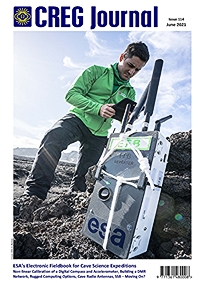
- The most recent issue to be published was 133
- For further information, please see Publishing/Despatch Schedule
- Database last updated on Sun, 25 Jan 2026 16:24:22 +0000
- Online access is currently available for all issues. Some of
the older issues are bit-map scans rather than digital copies.
journal scans.
- Online voting for CREG articles was withdrawn in June 2022. For info see
Voting for CREG articles
Contents of journal 114
June 2021
This page may take a few
seconds to load. Please wait ...
- CREG Journal 114 (0-24)
(PDF 4.9MB)
  Individual articles may be available below Individual articles may be available below
- This issue has a cover date of June 2021 and was published on 1 June 2021.
-
- Front Cover (1)
(PDF 1.9MB)

- Leonardo Turchi, the project lead on the Electronic Field Book, takes care to set up wi-fi repeaters to ensure smooth communication between the field segment and ground control. Photo: ESA, A Romeo
-
- Contents (2)
(PDF 289KB)

- List of contents and masthead information.
-
- News and Notes (2) For download see previous item
- Editorial Radar, Group Activities. Rob Gill.
-
- The Electronic FieldBook [EFB] as a Tool for Caves Science Operations (3-6)
(PDF 741KB)

- The EFB is an information system designed to support scientific documentation in extreme environments and data exchange with the surface. Leonardo Turchi, part of the ESA CAVES Team, outlines the characteristics of this tool, highlighting its usage during the last edition of the ESA CAVES 2019 astronaut training campaign.
-
- Non-linear Calibration of a Digital Compass and Accelerometer (7-10)
(PDF 679KB)

- Phil Underwood describes an approach to calibrating devices such as the Shetland Attack Pony (SAP), that addresses the non-linear response of sensors. This results in accuracy superior to more traditional methods.
-
- Update: Energy Harvesting (10)
(PDF 233KB)

- Further notes on energy harvesting and human-powered lighting by David Gibson.
-
- We Hear (11)
(PDF 358KB)

- Roundup of news and events: Mike Bedford brings us the latest to impact the world of cave radio and electronics. Wearable Microgrid Harvests Energy, Prometheus Drone for Cave Exploration, Lasers to Replace LEDs?
-
- The SSB Paradigm for Cave Radio is Outmoded - Is it Time to Move On? (12-14)
(PDF 375KB)

- If you want to build a cave radio that extends the art and doesn’t just repeat earlier work, then David Gibson argues that SSB techniques are outmoded. Not only is DSB modulation simpler, but it offers additional opportunities - including receiving SSB signals, if that is still required. Expressly, Gibson suggests that trying to implement traditional analogue SSB methods on a DSP platform is without merit, because tailored DSP techniques (such as the CORDIC used in Graham Naylor's Système Nicola) will perform so much better.
-
- Building a DMR Network (15-18)
(PDF 940KB)

- Tony Haigh discusses design considerations and practical experiences of building a trial Tier 2 DMR network for the Llanberis Mountain Rescue Team in North Wales.
-
- Cave Radio antennas (19)
(PDF 234KB)

- In another of our Fundamentals series (#5), David Gibson explains why we use induction loops and grounded electrodes as cave radio antennas.
-
- Buliding Blocks (20)
(PDF 531KB)

- The USB interface - how to exchange data, by Tony Haigh.
-
- Letters to the Editor (21)
(PDF 339KB)

- Data Transmission over a Long Single-Wire Phone Line, Brian Pease; HeyPhone Drawings, Rob Gill; LoRa, Daimon Tilley.
-
- Web Watch (21) For download see previous item
- Peter Ludwig looks at batteries with an incredible lifespan, lasers of incredible power and a way to cure adhesives without making them incredibly hot.
-
- Rugged Computing: Reviewing the Options (22-24)
(PDF 381KB)

- Mike Bedford outlines the options for those who have a need for computing resources in non-ideal environments, including on expedition and even underground.
-

|

View Contents:

BCRA is a UK registered charity and is a constituent body of
the British Caving Association,
undertaking charitable activities on behalf of the BCA.
BCRA publishes a range of periodicals and books.
Click here for further information.
|
Searching
To Search our pages using Google, type a search
string in the box at the top of the page and hit your Return key
You can also search our publications catalogue at the British Caving Library
The CREG Journal Search Engine is a new, powerful search engine which will, sometime, be extended
to cover Cave & Karst Science. We have a keyword search facility on our Cave Science Indexes pages but this may be rather out-of-date.
|
For staff use: Link to Database
Show/Hide
download figures next to each item (if available and non-zero; you might need to refresh page first). Counters last
reset on Thu 03-Jan-2019 17:29:28 +00:00. The figures are non-unique
click-throughs.
|









